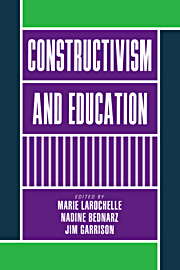Book contents
- Frontmatter
- Contents
- Preface
- List of contributors
- I Introduction
- II From epistemological constructivism to teaching: a variety of views
- III Teaching within the constructivist mode: practices and promises
- 5 Individual construction, mathematical acculturation, and the classroom community
- 6 The construction of answers to insoluble problems
- 7 Voice and perspective: hearing epistemological innovation in students' words
- 8 Constructivism-in-action: students examine their idea of science
- 9 Constructivism and ethical justification
- 10 Social studies, trivial constructivism, and the politics of social knowledge
- 11 Practical knowledge and school knowledge: a constructivist representation of education
- IV The mediating role of teachers and teacher education
- V Conclusion
- Notes
- References
- Index
10 - Social studies, trivial constructivism, and the politics of social knowledge
Published online by Cambridge University Press: 04 August 2010
- Frontmatter
- Contents
- Preface
- List of contributors
- I Introduction
- II From epistemological constructivism to teaching: a variety of views
- III Teaching within the constructivist mode: practices and promises
- 5 Individual construction, mathematical acculturation, and the classroom community
- 6 The construction of answers to insoluble problems
- 7 Voice and perspective: hearing epistemological innovation in students' words
- 8 Constructivism-in-action: students examine their idea of science
- 9 Constructivism and ethical justification
- 10 Social studies, trivial constructivism, and the politics of social knowledge
- 11 Practical knowledge and school knowledge: a constructivist representation of education
- IV The mediating role of teachers and teacher education
- V Conclusion
- Notes
- References
- Index
Summary
In most departments of psychology and schools of education, teaching continues as though nothing had happened and the question for immutable objective truths were as promising as ever.
von Glasersfeld, 1989, p. 122The growing popularity in mathematics and science education of the body of ideas known as constructivism is a hopeful sign of renewed interest in educational theory and practice in the United States. This is especially fortunate for social studies education, which has been bereft of significant developments in these areas in recent years. Recent research programs of social studies educators are showing promise, but the nearly exclusive attention on the development of historical understanding fails to address the need for a broader and more comprehensive social knowledge (Ashby, Lee, and Dickinson, 1997; Barton, 1997; Barton and Levstik, 1996; Brophy, VanSledright, and Bredin, 1992; Seixas, 1997, 1994; Thornton, 1997). May (1992) observes that no one has proposed the “radical restructuring” of social studies for studying the social, scientific, and technological issues that riddle the contemporary world; she asserts that a postmodern approach is needed to “promote an ecological, moral, cultural, pluralistic, and spiritual perspective, an ‘ethic of caring’ and a critical pragmatism”; and laments that social studies educators have instead “been guilty of rationalizing and simplifying the most intriguing and complex human endeavors and problems” (p. 81).
Constructivism is a postmodern theory of knowledge with the potential to transform educational theory. Its present popularity in science and mathematics education, however, is no assurance of its enduring influence on education in general or social studies in particular. One need only recall how Piaget's work has been previously misunderstood and effectively misused to bolster narrow curricular ends (Egan, 1983).
- Type
- Chapter
- Information
- Constructivism and Education , pp. 156 - 172Publisher: Cambridge University PressPrint publication year: 1998
- 8
- Cited by

